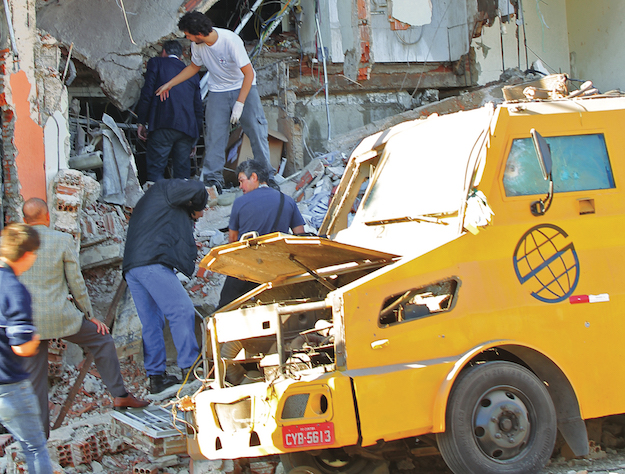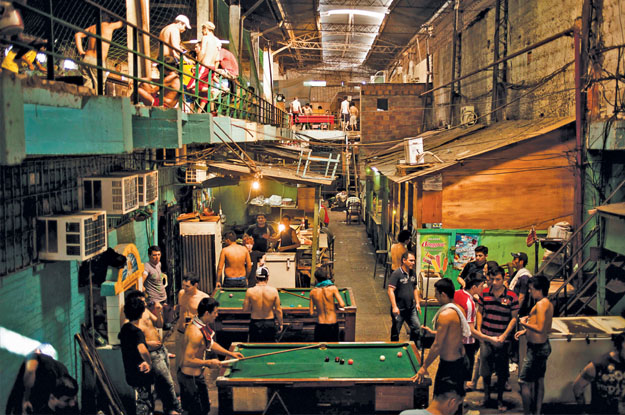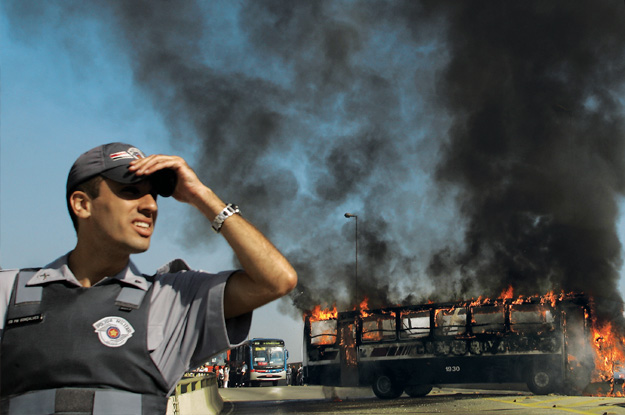This article is adapted from AQ’s print issue on transparency and the 2018 elections
Leer en español | Ler em português
Paraguay’s so-called Heist of the Century began just after midnight in April, when approximately 60 armed bandits poured out of the back of a cargo truck at the main offices of Prosegur, an armored car company in Ciudad del Este.
The robbers divided into 12-man teams, each squad including 10 “soldiers” and two snipers. These units secured the building’s perimeter — effectively sealing off the entire city block from police. Another team of attackers set up anti-aircraft guns to down any helicopters that might arrive on the scene. Then, the bombers arrived. Each bomber carried explosive charges that included three kilograms of C4 “plastique” explosive. The bombs were placed outside Prosegur’s central vault, said to hold $100 million in cash. Five detonated, demolishing the front of the Prosegur building and compromising the vault. Area residents initially thought they were experiencing an earthquake.
As the guards crawled across the floor, desperate to escape, the attackers loaded up sacks of cash and climbed into three bulletproof vehicles that navigated a path out of town with the logistical support of sniper teams. Witnesses reported that a caravan of masked men speaking Portuguese were last seen on the Paraná River in speedboats, headed toward Brazil.
Their total haul: $11.7 million.
The Hollywood-style attack was just the latest manifestation of one of South America’s most difficult policy challenges. The First Command of the Capital, or PCC for its initials in Portuguese, has grown in the last 25 years from a union of inmates seeking better treatment in Brazilian prisons into a multinational mafia with a global reach. Their criminal empire includes cocaine trafficking, kidnapping for ransom, ATM robberies, and large-scale assaults on businesses and banks, including the attack in Ciudad del Este. Through it all, the PCC has alternated between moments of extreme violence and years of quiet dominance in which the group expanded its control of Brazilian prisons and made inroads into the prisons of Paraguay and Bolivia as well.
 Officials survey the aftermath of the PCC’s explosive raid of Prosegur.
Officials survey the aftermath of the PCC’s explosive raid of Prosegur.
For South American governments already coping with severe fiscal crises, overwhelmed security forces and abysmal approval ratings, the PCC’s relentless rise has posed a truly vexing series of questions. Should they dedicate more resources to confronting the PCC — or would that make the violence even worse? Does filling jails with criminals help, or feed the core problem? Would it be better to pursue a sweeping reform of anti-narcotics policy — or would the PCC just move into other criminal activities, like kidnapping? If they do nothing, will that feed the continued rise of hardline, anti-democratic demagogues across the region?
“The PCC is a significant enough organization that if you try to eliminate it, you’re going to create a crazy amount of violence” similar to that seen in Mexico since 2007, said Graham Denyer Willis, an expert on organized crime and the PCC who works at the University of Cambridge. “Tens of thousands of people are going to get killed.”
Yet the status quo is undeniably nightmarish too. In 2017 alone, the PCC was involved in deadly prison riots in Brazil that left more than 150 dead, massive cocaine shipments from Paraguay into Brazil, and an epidemic of cargo robberies that have cost Brazilian companies more than $2 billion since the start of the decade. In Argentina, a cadaver pulled out of the Paraná River, where the group has sophisticated smuggling routes, was found wrapped in a blanket and a noose. PCC recruiters are now looking to convert former Colombian FARC guerrillas into PCC protégés. The PCC has cultivated a network of sympathetic politicians within Brazil and reportedly used banks in China and the United States to shelter its profits.
“In our country, PCC is a synonym for violence, blood,” said Francisco Gonzalez, a prison guard in Paraguay who works in the intelligence unit. “They are extremely violent. Before they had lots of enemies … but the PCC went on killing and killing, decimating those groups and adding (the survivors) to their ranks.”
In response, South American governments are sharing some information and personnel — but not nearly enough, critics say. “Why do the PCC (members) go to Paraguay and Bolivia? They are certain that there is no interchange of information,” said Sérgio “Major” Olímpio, a Brazilian congressman who is a former police officer determined to take down the PCC. “The collaboration with our neighbors is practically zero. It is absurd.”
An empire is born
I traveled to São Paulo to better understand how a group of elite prisoners — many in maximum security prisons — were able to organize such a vast empire. I began by visiting the Carandiru state prison, where in 1993, 111 prisoners were massacred by prison guards and thousands more tortured. It was here that the PCC formed, as a righteous revolt against abuse.
The PCC — also known as The Party of Crime in its early years — promised a united front against the prison system, and a war against the Brazilian state. The group chose as a logo the Chinese yin-yang, which they used to represent the balance between peace and violence necessary to survive. The PCC’s sophisticated structure and modus operandi were deeply representative of their native city — the financial capital of South America.
“This is a bold group, with an MBA-like administration and the type of determination only those deeply involved with hating the system have,” said Rafael Saliés, director of Brazilian operations for Southern Pulse, a security consulting agency. Saliés described the PCC as a decentralized organization with strict codes of discipline that works more as a franchise than a vertical hierarchy. “They are the closest thing to government that these individuals have,” he said.
Over the years, the PCC has benefitted from the rapid growth in the Brazilian prison population, which expanded sharply following implementation of prohibition-style drug laws passed in 2006. Between 2008 and 2014 Brazil’s prison population rose by a third. The nationwide system now holds approximately 700,000 prisoners, giving Brazil the world’s fourth-largest prison population. The system holds double its intended capacity, and inmates are often locked up 50 to a cell. Nearly a third of the inmates are there for drug-related charges.
Today the PCC wields iron-fist discipline over inmates, all of whom must pay monthly “union dues” ranging from 100 to 600 reais ($30 to $200). If the inmate can’t pay, they go into debt and must repay once they are on the street — usually by committing crimes. Members are expected to donate a portion of bank heists and kidnapping ransoms to the central organization.
In return, “union” members receive a series of somewhat sophisticated protections and guarantees. For one, they are far less likely to be abused by guards. Sexual assaults — which were rampant — have nearly been eliminated in the São Paulo prison system. The prisoners are forbidden to smoke crack but are given the freedom to be openly homosexual.
Union benefits also include money for lawyers, transportation for family (or lovers) wanting to visit, and Christmas presents for children. PCC members have continuing education with a unique curriculum: classes on armored car assaults and instructions on how best to blow up automatic teller machines. (Tip: Too much explosive turns the cash into confetti.) Members killed in violent acts also have the guarantee that their funeral costs will be paid.
Recent years have seen a severe crisis of confidence in Brazil’s traditional institutions following the collapse of the economy, the explosion of the Car Wash corruption scandal, the impeachment of Dilma Rousseff, and the profound unpopularity of her successor, President Michel Temer. Partly as a result, the PCC’s system of rules and justice — including an alternate justice system — is seen as “deeply legitimate” by its members and many communities, said Willis. “They trust that this actually makes sense, much more than they trust the law that the state uses.”
Karina Biondi, a social anthropologist who has spent years studying the PCC’s influence in the São Paulo area, agreed. “It is not that you are being punished by an all-powerful state, but you are facing the consequences for your actions. This resonates with people.”
The PCC has three kinds of punishments: “a warning, a beating and a breaking,” usually of the legs, said a São Paulo crime reporter who asked not to be named for fear of reprisals. “Sex crimes always receive a death sentence,” he said, referencing the PCC’s recent execution of a priest who had allegedly abused children. “Their motto is ‘Peace, justice and liberty.’ But in practice, what guarantees peace is violence.”
International Expansion
The PCC has become the most powerful player in Brazil’s multi-billion-dollar cocaine market, which is now second in size globally to the United States. But the group’s ambitions are clearly bigger than Brazil alone.
Once known as a group that resold drugs at boca de fumo (drug dens), over the past two years the PCC has consolidated control over key border areas, including, the Paraguayan-Brazilian border near Ciudad del Este. Originally the PCC would buy cocaine wholesale and distribute the drugs inside Brazil, but now it has begun to make deals directly with cocaine producers in Bolivia and Peru and become a part of the supply chain.
To eliminate the competition along the Paraguayan border, the group used a .50 caliber machine gun mounted inside a pickup truck and ambushed a rival with a level of firepower usually found in war zones. With control of the Paraguay-Brazilian border established, the PCC is moving to take over power inside the Paraguayan prison system.
“The PCC handle a lot of money in prison and they are very protected by the (prison) staff, and they began to kill us and our companions here in prison,” said one 28-year-old inmate inside the Tacumbú prison in Asunción, Paraguay. AQ is withholding his identity to protect his safety. “They wanted to take control of the prison and kill whoever they wanted,” he said. “They killed many. I almost died and my friend was killed. Nothing happened to them (PCC), because they manage the guards and manage the prison.”
 In Tacumbú prison, the largest in Paraguay, 80 percent of prisoners haven’t been convicted.
In Tacumbú prison, the largest in Paraguay, 80 percent of prisoners haven’t been convicted.
With its porous borders and highly corrupt institutions, Paraguay has become a base of operations and a safe haven for the gang. “PCC members are migrating to our country. The majority of them are criminals who escaped Brazilian prisons. They pass the frontier because it is very permeable,” said Alejo Vera, a Paraguayan prosecutor working on anti-terrorism and anti-kidnapping cases. His unit has arrested 30 PCC members over the past two years, he said. Despite regular deportations of PCC members and joint operations with the Brazilian police, Vera said that Paraguayan officials feel “we are being overwhelmed by foreign (criminals).”
Bolivian officials are also concerned and estimate that along the border with Brazil, the PCC presence involves an estimated 1,500 operatives. Eduardo Gamarra, a political science professor and expert on prisons at Florida International University, thinks the true number may be higher and likely involves what he described as “mid- and top-level decision-makers.”
Beginning in July 2017, Brazilian national police began posting high-ranking officers in key Bolivian cities to monitor the expansion of the PCC and coordinate security operations with their Bolivian counterparts. A shootout and robbery in July 2017 led by Brazilian criminals left five dead in the city of Santa Cruz and prompted the Brazilian government to respond to longstanding concerns of Bolivian police commanders who have been monitoring the influx. “We are maintaining constant contact with the Brazilian authorities,” said Abel de la Barra, national commander of the Bolivian police.
Given the absence of major cartels or gangs ruling the criminal underground in Bolivia, Paraguay, Argentina and Chile, some analysts see an opening for the PCC to further expand. “The state has no capacity to enforce anything in prison,” said Gamarra. “The easiest thing to do, in fact, is to let the prisoners run the prison. That’s why everything becomes available inside prison, it becomes a parallel economy, a parallel everything. You want drugs, you got drugs, you want a new TV set? I’ve been in some prisons in Latin America where the prisoners have everything from hookers to cable TV.”
Márcio Christino, a prosecutor in São Paulo who has written two books on the PCC, agreed. “The PCC is in Brazil, Bolivia, Paraguay and entering Uruguay, and Argentina. They are going in that direction. There is a vacuum and they are going to expand and expand. And dominate.”
No magic bullet
Some Brazilian politicians say the best way to blunt the PCC’s rise is to accept their presence — and reach an accommodation or armistice of sorts. It’s a decision not taken easily but is based on recent attempts to crack the PCC.
Previous episodes of confrontation with the PCC produced extreme bloodshed. A May 2006 uprising by the group led to the virtual shutdown of São Paulo for two days as the group’s gunmen rampaged throughout the city, assassinating an estimated 50 police and prison guards. The São Paulo government was forced to initiate direct negotiations with the PCC’s head — a legendary bank robber named Marcola — for the siege to end. Many political analysts in Brazil suggest that Marcola and Geraldo Alckmin, the governor of São Paulo, negotiated a settlement that left São Paulo in peace and the PCC in power.
Some suggest the São Paulo government itself may have become reliant upon having the PCC adjudicate law and order issues that were typically key responsibilities of the state. “São Paulo state is short on money, and extremely short on intent. And the PCC provides a certain order to the prison system that avoids major prison riots — most of the time, when they’re not provoking them,” said Saliés. “I think they’d rather have (the PCC) than not.”
But that approach has taken a toll. The PCC continued a low-level guerrilla warfare campaign against the Brazilian state, murdering police and ambushing prison employees (most recently when a PCC gunman shot dead a prison psychologist while she was holding her 10-month-old baby.) “The PCC from the beginning raised the flag for peace, justice, liberty. But up to now, what have they most done? Kill other prisoners,” said Christino, the São Paulo prosecutor who has spent nearly 20 years investigating the gang. Christino has heard all the arguments for the PCC being a stabilizing force and staunch advocate for prisoner’s rights. He doesn’t believe a word. “They talk about peace but who kills the inmates? Ninety percent of the inmate homicides are carried out by the PCC,” said Christino, who wrote Rivers of Blood (November 2017), a history of the PCC.
Brazilian officials, starved for cash amid one of the country’s worst recessions, have repeatedly frozen or redirected funds intended for security. The federal government spent just 40 percent of the 470 million reais it had budgeted for its National Public Security Fund in 2016, the last full year for which data are available, according to O Globo.
With the state unable or unwilling to confront the PCC, citizens are forming vigilante militias and WhatsApp groups, clamoring for a brutal crackdown on criminals. Open calls for “extermination” and “cleansing” of criminal elements are regularly posted on Facebook pages celebrating the death of prisoners. National Youth Secretary Bruno Julio said, “There should be more killings. There should be one massacre every week” to eliminate suspected criminals. Though he was forced to resign in January 2017, Julio was widely hailed on Facebook as a champion of the people.
While traditional political solutions often focus on “accommodation” or “elimination,” social scientists tend to agree the only road to countering the PCC is a full-scale attack on the type of social exclusion that leaves millions of Brazilians and other South Americans living precarious lives with limited access to fresh water, basic education and employment. “The PCC has come to exist because the political system has come to leave many people in a state of abandonment, so they had to find other kinds of solutions,” said Willis. “It’s not a question of capacity or resources. It’s a question of political will.”
But with sky-high murder and assault rates, many Brazilians are frustrated by the seeming impunity of the PCC and other criminal groups. As I left the Carandiru prison — now a museum — I climbed into a taxi and mentioned what a shock it had been to read about the slaughter of more than 100 prisoners by the guards many years earlier. The taxi driver looked at me and said, “Massacre for some, cleansing for others.”
It was an open call for the extermination of the organized criminals who now reign over São Paulo, a call I heard repeatedly throughout my stay in the city. Few of the proponents I spoke with thought it would do much good toward thwarting the PCC, but the idea of having them killed off like livestock at the butcher seemed to quench a thirst for justice at any cost.
“Since the first manifestations of the PCC, the authorities have been trying to destroy it,” said Biondi. “The remedies used against the PCC are precisely what make it grow: more imprisonment, longer sentences, hardening of the treatment of prisoners, greater restrictions, transfers and isolation of supposed leaders.”
“There is no magic wand that solves this, because the problems are so deeply structural,” said Gamarra, a political science professor. Instead, he said, “the issue is always, do you really have the resources to change the structure of these favelas? Because if you don’t, you’re always going to have the problem of this recruitment mechanism. You have to be able to recruit people into other areas. It’s really competition for labor. If you don’t offer these guys any other alternative, they’re going to go in there. I think I would be a member of PCC if I were only given those opportunities.”
Photo credits: Agencia Estado/AP; Santi Carneri






